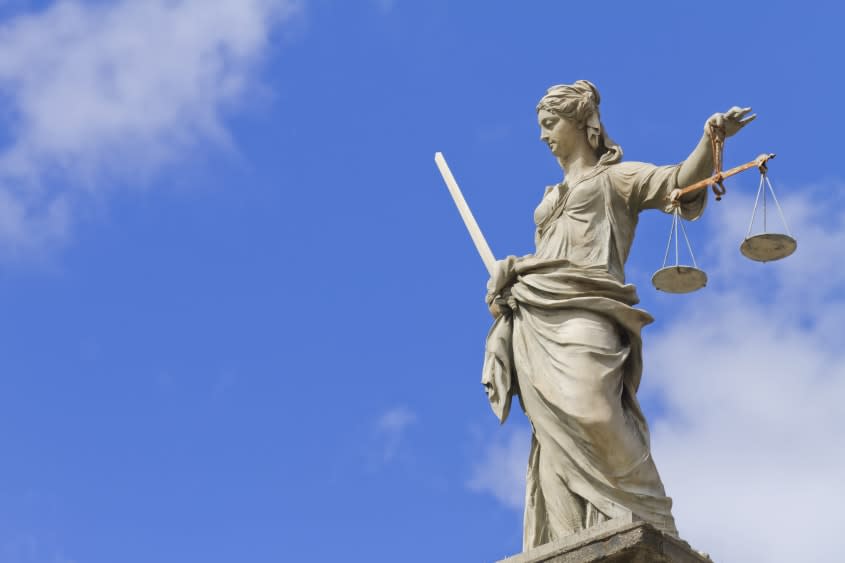Is the Manhattan case against Trump really so 'novel'?

- Oops!Something went wrong.Please try again later.
Former President Donald Trump is the first U.S. president, former or current, charged with a felony. And after his arraignment in New York City on Tuesday, we know more about what alleged crimes Manhattan prosecutors say he committed.
Trump is facing charges tied to the payment of hush money to porn actress Stormy Daniels shortly before the 2016 presidential election. The relevant charge Manhattan District Attorney Alvin Bragg's grand jury indicted Trump on is the falsification of business records, a misdemeanor, elevated to a felony by alleging the concealment of payments to Daniels was for the unreported benefit of his presidential campaign, which could be a campaign finance violation.
Tying the state business falsification charges to a federal election could be "a difficult maneuver" for Bragg, as it appears to be "a legal theory that has never been evaluated by a judge" in the state, The New York Times reports. "If it's a federal campaign finance crime, that is pretty novel legal terrain," Kate Shaw, a law professor at Cardozo School of Law, told ABC News before the charges were unveiled, though "grand jury proceedings are secret, and we are largely speculating."
But is charging Trump for a combination of hush money and campaign finance violations really that unusual? And could it be a winning strategy?
What are the commentators saying?
Individually, there's nothing unusual about the charges. "The false business records charge is the bread and butter of the district attorney's office white-collar practice," the Times reports, adding that since Bragg took office at the beginning of 2022, "prosecutors have filed 117 felony counts of the charge, against 29 individuals and companies."
"New York prosecutors regularly bring and win prosecutions for felony violations of the state's books and records statute on falsifying business records ... including for conduct far less serious than the allegations against Trump," Siven Watt and Norman Eisen write at Just Security. In fact, an analysis of "17 analogous campaign finance and related prosecutions in the State of New York and nationally" shows that "third-party payments covertly made to benefit a candidate are routinely and successfully prosecuted as campaign finance violations in New York and elsewhere under a variety of state and federal statutes."
At the same time, perhaps the most analogous case to Trump's is the prosecution of former Democratic presidential candidate John Edwards over hush money paid to a mistress during the 2008 presidential campaign, The Washington Post reports. In 2011, "Edwards was charged with federal campaign finance violations, accused of hiding the affair using money from donors that should have been reported to the Federal Election Commission."
"After a six-week trial, a North Carolina jury balked at the case, acquitting Edwards of one count and failing to come to a verdict on five others," the Post continues. "Without more details of the case against Trump, comparing the Trump and Edwards matters is difficult," but in the Edwards case, the Justice Department dropped the case.
"You know, it's not a slam-dunk," Jerry Goldfeder, a special counsel at Stroock & Stroock & Lavan LLP and a recognized expert in New York state election law, tells the Times. "But I think that survives a motion to dismiss, and then let the jury decide."
What's next?
"It is a long way from indictment to conviction to affirmance on appeal," former federal prosecutor Joyce Vance writes in her Civil Discourse Substack. "No prosecutor wants to gamble the outcome of a case like this on an appellate court's decision, possibly years down the road, on a previously unresolved legal issue," but "while some people have suggested that the charges in Manhattan are insignificant, I don't see it that way. The Stormy Daniels incident is the origin story for Trump's confidence that he could manipulate elections and Americans to his own benefit."
Aside from the specific charges, the idea of prosecuting a former leader is "ordinary in other democracies," the Idaho Statesman writes in an editorial. South Korea routinely jailed its former presidents, and "Nicholas Sarkozy, the former French prime minister, was sentenced to a year in prison in September for campaign finance violations. Our country's founders contemplated that this would be ordinary here," the Statesman adds. "It's high time a president was held to the same standards as ordinary people: If there's evidence, you're charged and you get your day in court."
You may also like
Scientists break record for fish filmed in deepest waters to date
Former Manhattan D.A. says federal prosecutors asked him to 'stand down' on Trump hush-money probe

